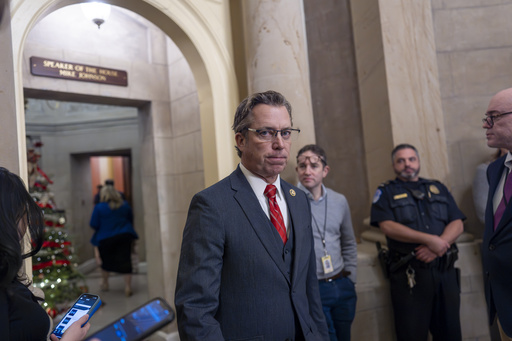
WASHINGTON — As the deadline for a government shutdown approaches at midnight on Friday, House Speaker Mike Johnson is unveiling a proposal to temporarily fund federal operations and provide disaster relief. However, this plan postpones demands from President-elect Donald Trump for an increase in the debt limit until the new year.
House Republicans have been in closed-door discussions to decide on their next actions, especially after Trump reiterated his insistence that any deal must include a debt ceiling increase. In a post early in the day, he suggested that if this condition is not met, the government should “start now” with the closures.
Johnson has stated, “We will not have a government shutdown,” as he exited a meeting at the Capitol. Although he did not reveal the specific details of the new plan being considered, insider reports indicate it aims to maintain government funding at current levels until March. It would also allocate $100 billion for disaster aid and $10 billion for agricultural assistance.
Trump’s request for a debt ceiling increase has been removed from this proposal, with GOP leaders indicating that it will be addressed in future discussions associated with tax and border policies in the upcoming year.
Meeting Trump’s last-minute demands appears nearly impossible. Johnson recognizes that many members of his party prefer to cut government spending rather than increase it, making it challenging to gather enough support for any proposed package. Consequently, he has been engaged in negotiations with Democratic Leader Hakeem Jeffries, whose backing is essential to pass any agreement. Voting could take place on Friday afternoon.
“We will meet our obligations,” Johnson declared, signaling his intent to find a resolution.
Trump’s influence is evident even before he officially takes office, as he manages congressional strategies from Mar-a-Lago alongside billionaire Elon Musk, who is slated to lead the new Department of Government Efficiency in the incoming administration.
“If there is going to be a shutdown of government, let it begin now,” Trump asserted on social media, indicating his indifference towards the implications of a government shutdown, which many political leaders see as detrimental to American citizens’ well-being. The Trump administration has committed to reducing the federal budget by cutting positions across various departments. Notably, Trump previously oversaw the longest government shutdown in U.S. history during his first term, which spanned a month over the 2018-19 holiday season.
A significant concern for Trump is ensuring that the contentious debate over the debt ceiling is delayed until after his inauguration. The current federal debt limit is set to expire on January 1, and Trump aims to avoid being embroiled in complex negotiations early in his administration, which would grant leverage to the Democratic minority.
“Congress must either eliminate the debt ceiling or extend it potentially to 2029,” Trump tweeted, amplifying his demand for a five-year debt limit increase. “Without this, we should never make a deal.”
As Johnson hustles behind the scenes to avert a shutdown, he faces constraints on his power. Both Trump and Musk have rallied their supporters against an earlier bipartisan proposal from Johnson, which included disaster aid but did not tackle the debt ceiling issue. A revised plan supported by Trump that proposed a two-year debt limit increase through 2027 was also rejected, garnering criticism from both Democrats and Republicans for being inadequate.
Vice President-elect JD Vance made an early appearance at the Capitol to meet with hardline members of the Republican House Freedom Caucus, indicating the divisions within the party.
During a House Republican meeting over lunch, Johnson requested a show of hands to gauge support for moving forward, as stated by Rep. Ralph Norman. With government employees bracing for the potential impact of a shutdown, many fear that this could lead to millions being affected financially as they approach the holiday season without paychecks.
Hakeem Jeffries, the House Democratic Leader, criticized the situation, stating, “Welcome back to the MAGA swamp,” and emphasizing that a government shutdown could devastate the economy and harm working-class Americans.
Behind the scenes, Jeffries and Johnson have been in discussions on finding a way forward, as reported by sources familiar with a private Democratic caucus meeting. On the Senate side, where Democrats maintain control for a few more weeks, there are conversations aimed at reviving the earlier bipartisan package that Johnson, Jeffries, and Senate leaders had previously negotiated.
Senate Majority Leader Chuck Schumer described that original agreement as “the quickest, simplest, and easiest way we can make sure the government stays open while delivering critical emergency aid to the American people.”
Senator Patty Murray, D-Wash., emphasized her commitment to this bipartisan deal, stating, “I’m ready to stay here through Christmas because we’re not going to let Elon Musk run the government.”
As President Joe Biden continues to engage in these discussions alongside Schumer and Jeffries, his public role in the debate has been limited, drawing ire from Trump and Republicans eager to shift responsibility for any impending shutdown onto him.
Biden’s press secretary recently stated, “Republicans blew up this deal. They did, and they need to fix this.”
Johnson’s challenge to keep the government operational, placate Trump, and secure his position as speaker is substantial. The first vote of the new Congress, which begins on January 3, will be for the speakership, and Johnson will need nearly unanimous support from House Republicans to maintain his leadership role, while Democrats are expected to throw their votes behind Jeffries.
As Johnson navigates the turbulent political waters in Washington, he faces significant scrutiny from both sides, particularly evident at a recent conservative conference where Trump ally Steven Bannon criticized him openly, stating, “Clearly, Johnson is not up to the task. He’s gotta go,” inciting enthusiasm from the crowd. Bannon further emphasized, “President Trump? These are your people.”
